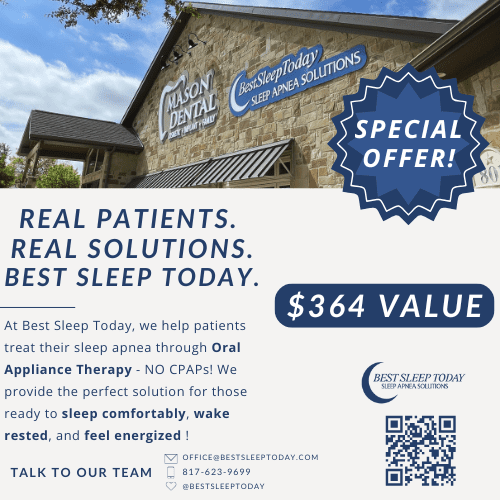Are you constantly tired, even after a full night’s sleep? Do you wake up with headaches or struggle to concentrate during the day? These could be signs of a common but often undiagnosed condition: sleep apnea. Millions of Americans go to bed and wake up without realizing that they are in danger from an undiagnosed condition. It’s time to change that. It’s crucial that people have the chance to explore the importance of getting screened for sleep apnea, its symptoms, potential side effects, and treatment options.
Understanding Sleep Apnea
Sleep apnea is a serious sleep disorder characterized by repeated interruptions in breathing during sleep. These pauses can last from a few seconds to minutes and may occur 30 times or more per hour. The most common type is obstructive sleep apnea (OSA), where the airway becomes blocked or collapses during sleep. If this sounds serious, it’s because obstructive sleep apnea is extremely serious. OSA harms an individual’s sleep, quality of life, and more.
Common Symptoms of Sleep Apnea
Recognizing the symptoms of sleep apnea is the first step towards diagnosis and treatment. You might experience loud snoring, gasping or choking during sleep, and excessive daytime sleepiness. Morning headaches, difficulty concentrating, and irritability or mood changes are also common. Many people with sleep apnea report waking up with a dry mouth or sore throat, experiencing restless sleep, or suffering from insomnia. A decrease in libido is another potential indicator. It’s important to note that not everyone who snores has sleep apnea, and not everyone with sleep apnea snores. If you experience any combination of these symptoms, it’s crucial to consult with a healthcare professional.
The Hidden Dangers of Untreated Sleep Apnea
Left untreated, sleep apnea can lead to a host of serious health problems. The repeated drops in blood oxygen levels and disrupted sleep can take a toll on your body over time. Cardiovascular issues such as high blood pressure, heart disease, stroke, and irregular heartbeats are common complications. Sleep apnea has also been linked to type 2 diabetes, liver problems, and metabolic syndrome. It can lead to complications with medications and surgery, and even cause eye problems like glaucoma. Pregnant women with sleep apnea may face increased risks. The condition can also strain relationships due to loud snoring and restless nights. Perhaps most alarmingly, the excessive daytime sleepiness caused by sleep apnea significantly increases the risk of motor vehicle accidents. All of these factors contribute to an overall decreased quality of life for those with untreated sleep apnea.
The Importance of Getting Screened
Many people with sleep apnea are unaware they have the condition. In fact, it’s estimated that potentially millions of moderate and severe casesof obstructive sleep apnea remain undiagnosed. This is why screening is so important. Getting screened for sleep apnea can help identify the root cause of your symptoms and prevent or manage related health complications. It can significantly improve your sleep quality and overall quality of life. Proper diagnosis and treatment can reduce the risk of accidents due to daytime sleepiness, enhance your performance at work or school, and even improve relationships affected by sleep disturbances.
Sleep Apnea Screening Options
If you suspect you might have sleep apnea, there are two main types of sleep studies used for diagnosis: laboratory sleep studies and home sleep studies.
A laboratory sleep study, also known as polysomnography, is conducted in a sleep center or hospital. During this overnight test, you’re connected to various monitors that track your brain waves, heart rate, breathing patterns, oxygen levels, and body movements. This comprehensive study provides detailed information about your sleep patterns and can diagnose sleep apnea and other sleep disorders. While it offers the most comprehensive data and can diagnose other sleep disorders under the supervision of trained technicians, it is more expensive and requires sleeping in an unfamiliar environment.
On the other hand, a home sleep study allows you to undergo sleep apnea testing in the comfort of your own bed. You’ll be provided with a portable monitoring device to wear while you sleep. While not as comprehensive as a lab study, it can effectively diagnose obstructive sleep apnea in many cases. Home sleep studies are more comfortable, convenient, and less expensive than lab studies. They provide a more realistic sleep environment and typically have shorter wait times for testing. Best Sleep Today helps patients get started on their sleep journey with a home sleep study.
Treatment Options: Introducing Oral Appliance Therapy
If you’re diagnosed with sleep apnea, there are several treatment options available. While Continuous Positive Airway Pressure (CPAP) therapy has long been considered the gold standard, many patients find it uncomfortable or difficult to use consistently. It can be expensive to deal with the maintenance, as well. This is where Oral Appliance Therapy (OAT) comes in as an excellent alternative.
Oral Appliance Therapy involves wearing a custom-fitted dental device, similar to a mouthguard, while you sleep. This appliance works by gently repositioning your lower jaw and tongue, keeping your airway open throughout the night. OAT offers several advantages over other treatments. It’s comfortable and easy to wear, portable and convenient for travel, and operates silently. Unlike CPAP, there are no masks, hoses, or machinery involved, leading to high patient compliance rates. Most importantly, it’s effective in reducing or eliminating sleep apnea symptoms for many patients.
What’s Next?
If you’re diagnosed with sleep apnea, know that effective treatments are available. Oral Appliance Therapy offers a comfortable, convenient, and effective solution for many patients. Don’t let sleep apnea silently affect your health and well-being. Take action today by discussing your symptoms with a healthcare provider and exploring your options for screening and treatment with Best Sleep Today.












